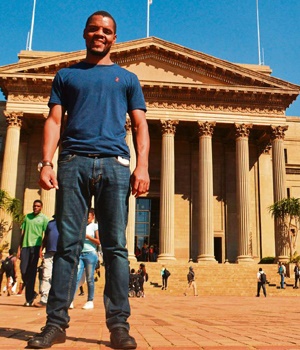
Similarly, an increasing number of white South Africans seemingly feel justified in regressing to a kind of racism that would have been unthinkable immediately after democratic transition. There are also too many who now want to undermine the full extent of the evils that apartheid and colonialism were, and the blight they still are today.
Even more worrying is the ongoing resistance to measures intended to remove structural impediments to the creation of a more equal, inclusive and fairer society. Racism in all its forms – structural, inherited, petty, small-minded, brutal, anti-foreigner ... the list goes on – continues to be a problem.
There are disturbing and increasing levels of unease in our society. Too many still live their lives in grinding poverty. And they see many of their compatriots, white and black, living in a manner they can only dream of.
This has created anger – especially among the young in our society – deepened by the seeming hopelessness of their circumstances.
Left unchecked, this rising tide of unease poses a real risk to creating a fair, inclusive, caring, more equal and prosperous society – our nation-building project itself.
The growing unease finds daily expression on campuses throughout our country, including Wits University.
In our engagements with the current students’ representative council (SRC) leadership, we were told some poor black students at Wits today go through their studies with the indignity of having no food for days. In response, a Wits food bank was set up, and there are faculty-based initiatives to gather food and clothing for students in need – interventions that are to be applauded and actively supported.

We were also told about students who live in Soweto, but can’t afford the cost of a daily commute. They sleep in the library a few times a week. You would have thought that if a young person earned the right to study at one of our country’s premier universities, they would be saved this indignity.
The academic staff composition of Wits has also been slow in transforming, with black academics remaining a distinctly artificial minority. All Wits alumni – and there are many highly decorated ones – should be ashamed that many studying and working at their alma mater continue to confront such a harsh, untransformed reality. Wits should be welcoming of all students who satisfy its exacting entrance requirements.
Wits must become a microcosm of what South Africa can be. A beacon of excellence, but also a place that encourages empathy for the poor and consistently challenges conduct that makes the learning experience unpleasant for some because of their race.
There has to be zero tolerance for racist conduct. We must seek rather to build nonracialism. Its true beauty is its humanism. Fundamentally, it recognises that there is only one race, the human race, and that all people should be treated equally. It is a unifying principle, one which makes our individual dreams legitimate, and allows our society to believe in a common purpose and future – based necessarily on ongoing reparation, redistribution and reconciliation.
If we can break the back of the indignity of poverty and racism at Wits, there is surely a chance of a fairer South Africa.
Indeed, Wits has a history of being a signpost to a more progressive society, mostly because of its tolerance for brave activism by its student body.
Young people must, and will always, agitate for the betterment of society, and universities must create space for principled and disciplined activism, and the energetic expression of fresh ideas.
When we were Wits students, we all had the benefit of insights from a long list of struggle stalwarts, men and women who spent hours with us in public meetings, countless workshops and engaging conversations. They gave us a deep sense of history. We began to understand we did not invent the struggle against apartheid and were a part of a glorious, albeit painful, past.
These interactions imbued us with a desire to build a new society on the progressive foundations of nonracialism and nonsexism. They helped us to contextualise our struggle internationally and develop a deep sense of solidarity with progressive freedom fighters in many other parts of the world.
In the process, we developed a keen sense of right and wrong.
We need to stand side by side with the current generation of student leaders, understand their unease and their struggles, share experiences and, hopefully, develop a common appreciation for the values so painstakingly passed down to us.
Moseneke was president of the Black Student Society at Wits in 1985/86. Creamer was president of the SRC at Wits in 1991/92




 Publications
Publications
 Partners
Partners








